Today we reminisce about
The Big Bounce (1969)
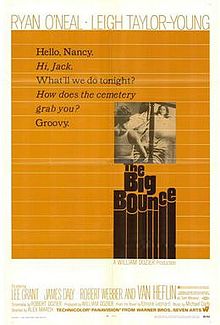
Directed by Alex March
Starring: Ryan O’Neal, Leigh Taylor-Young, Robert Webber, Lee Grant, Van Heflin
Synopsis
A video is shown in a local police precinct depicting a brutal fight between two employees of Ritchie Produce, Inc., a farm that offers jobs to migrant workers in California. One of the men is Jack Ryan (O’Neal), a Seattle-native with a chequered past who never quite made it back home after the Vietnam War. He gets into a tiff with a Mexican man named Comancho and ends up severely beating him with a baseball bat. Officials prefer incarcerating Ryan for his crime though the justice-of-the-peace, Sam Mirakian (Heflin), argues that Ryan needs to be given another chance and be released from jail. Eventually Ryan is bailed out by his employer and the charges against him are dismissed. Ryan is then given some money for bus far to get out of town by his supervisor Bob Rodgers (Webber), who warns him to leave as quietly and as soon as possible.
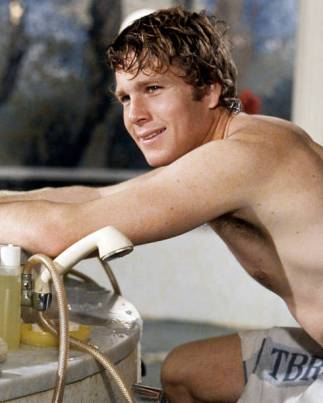
Before leaving, Ryan decides to stop by a nearby bar to get a drink. Mirakian, who is also there, recognises Ryan and offers for him to sit down. He shows a good deal of sympathy towards Ryan, hinting that he had experienced some trouble with the law himself as a young man. When Ryan ends up missing his bus, Mirakian offers him a job working as a handyman at the Bay Vista Motel for $50 a week plus room and board. He initially refuses the offer and instead sets his sights on a beautiful woman at the bar (Grant). They go to her place, ironically also located at the Bay Vista Motel, and spend the night together. The woman has a young daughter as well as a complicated home life, prompting Ryan to hastily leave. Although he happens upon her and her daughter on several other occasions, Ryan is very distant with her and instead focuses his attention on the beautiful mistress of his former boss at the produce farm, Nancy Barker (Taylor-Young).
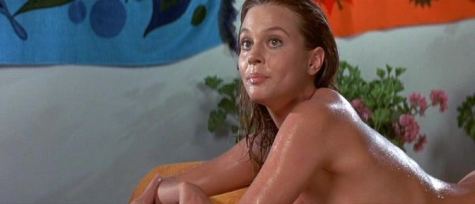
Presented as Mr. Ritchie’s secretary, Nancy is openly flirtatious and bored with spending her summer at her lover’s beach house, only being able to go out when he visits her on the weekends. She easily takes to Ryan’s attentions and starts spending a lot of time together. Nancy reveals herself to be fascinated with deviancy, conjuring up criminal situations and then acting them out. Knowing that Ryan has a criminal past, she tries to get him to embezzle $50,000 of Mr. Ritchie’s money after he pimped her to a Senator with whom he was making a business deal. Ryan initially goes along with the scheme until Nancy’s behaviour becomes more and more out-of-control.
Background
Based on a 1966 novel of the same name by author Elmore Leonard, The Big Bounce had a hard time getting published due to a lack of interest. In fact, it was not until 1969 that it was finally put in print after it was purchased by film producers at Warner Bros.-Seven Arts to be made into a film.
The Big Bounce was not enthusiastically received by audiences and even less so by critics. It is perhaps no surprise that the book made even less of an impression, disappearing into near oblivion. Leonard would finally be successful over 25 years later when the 1995 film adaptation of his 1990 novel Get Shorty became a box-office hit. Somehow, interest in The Big Bounce was renewed and plans were made for a remake of the original film. Unfortunately for Leonard and Hollywood, moviegoers were still not sold on the idea of the film and the 2004 version also proved to be a dud.
Lee Grant
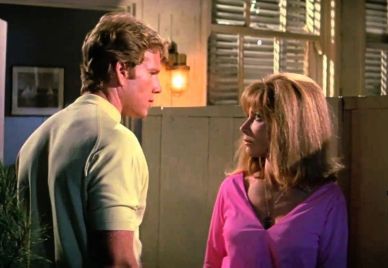
I had no knowledge of this film before choosing it for the Lee Grant Blog-a-thon. As most of her other pictures had already been chosen, I decided to go out on a limb with one of the remaining selections. As it turns out, Lee has a minimal role in The Big Bounce although her character had the potential for a larger and more significant storyline.
In the film, Lee’s character is simply known as “The Girl in Number 12” despite being credited as “Joanne” on the official cast list. She appears to be in her early 40s and lives alone with her young daughter (between 8-10 years of age) after having been abandoned by her husband for a younger woman. Her emotional state is very fragile due to her low self-esteem combined with her heavy drinking habit. It appears as though she is looking for a man who will love her while simultaneously becoming a father figure for her daughter. There is a man in her life when Jack comes along but Joanne does not seem to be keen on him other than for the financial stability their union could bring. Jack makes it clear that their affair was only a one-time sexual encounter, further depressing her. Even after she tries opening up to him about her personal issues, just to have someone with whom to talk, Jack outright rejects her and blatantly shows that he has zero interest in caring about or even listening to her.
In the few scenes she has, Lee displays a fine performance added the fact that she is very attractive. The brevity of Joanne’s relationship with Jack was disappointing because it would have been nice to see how they could have grown together and moreover, revealed the effect she would have had on Jack’s interactions with Nancy. I find it odd that a character written to be little more than a one-night stand would have been given a credited role. Frankly, Lee’s talents are wasted on this film that, in reality, did little for its other stars.
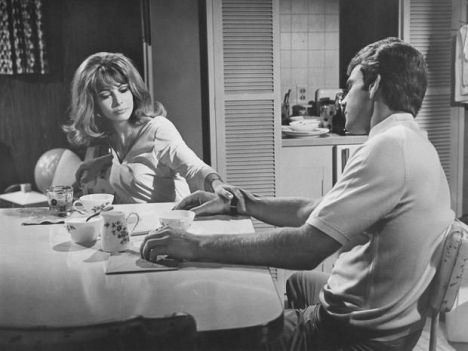
Thoughts
This marked 28-year-old Ryan O’Neal’s feature film debut and was the second picture for his co-star/then-wife Leigh Taylor-Young. O’Neal’s performance was rather stale and passionless on the whole though he proved to be quite a nice distraction in the Looks Department. Taylor-Young was much more convincing and showed a wide variety of acting abilities, particularly towards the end of the film when Nancy essentially goes mad. It is obvious that the film is tailored to Taylor-Young as her beauty is heavily emphasised including a few featured nude scenes, one which shows her in all her frontal glory. The one detail that is truly hard to believe about her character Nancy is that she is supposed to be, at the very maximum, 17-years-old.
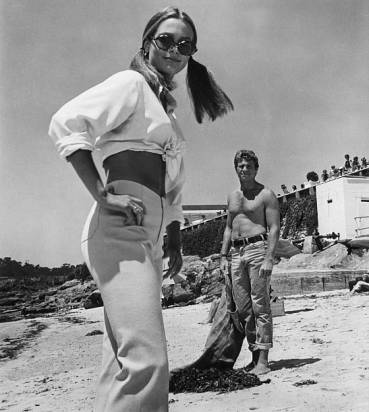
The supporting cast is probably the best thing about the film, notably veteran actor Van Heflin and character actor Robert Webber. Heflin’s Mirakian is a very solid type of guy who is upfront and honest but overall very supportive. O’Neal was lucky in his scenes with Heflin because it raised his novice skills to a more acceptable level of acting. Although I do not believe that Heflin was proud to have this film as a part of his filmography, he obviously had a good time making it. Webber is a familiar face from movies and television series throughout the 1970’s and 1980’s. He had an important role in this film and performed righteously, earning my respect as a serious actor who should have been offered more big time roles.
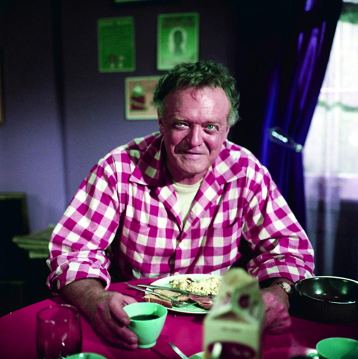
My overall impression of this movie is not a good one by any means. The story fails to deliver on the promise of its grand sounding title. There is, in fact, no “big bounce” but rather only a thwarted promise to commit a crime. Lee Grant’s character is introduced, not really built up, and then disappears into thin air. Nancy is probably the most interesting character in the film but her antics are annoying and she is not redeemed in any way. All in all, this was a very unsatisfying movie that also had a very bizarre soundtrack. Some scenes had jazzy/disco-y elevator music playing for unknown reasons, making it slightly uncomfortable to take the film seriously. It’s not often that I say this but avoid this film if you can.

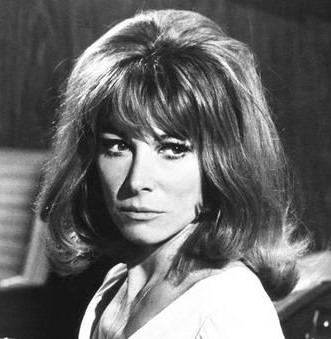
Wow, this one looks sexy—Ryan O’Neal and Leigh Taylor Young both look like they were “carved out of cream cheese” as Steel Magnolias author Robert Harling would say. Lovers in real life, they really did have electric chemistry—but I guess, not enough to save this picture.Nevertheless, you’ve made me want to take a look at this one again. Saw it when I was a kid…
And you are right, Lee Grant is absolutely gorgeous here…and again, her presence in the movie all too brief.
Thanks so much for joining our blogathon! Love your blog, by the way!!
LikeLiked by 1 person
LOL “Carved out of cream cheese” is a great way to put it! They both looked very youthful which is surprising considering that Ryan was already a father of three, including a 2-year-old son with Taylor-Young. There were no qualms about them playing together but she definitely had the upper hand on the acting bit.
I’m glad that you my article makes you reconsider the film and perhaps you may enjoy it a bit differently the second time around. Nancy was a very interesting character and it would have been great for them to explore why/how she got to be Mr. Ritchie’s mistress and at such a young age.
Interestingly enough, I’ve seen Lee as a scorned lover twice now, in both this and ‘Shampoo’. I will definitely seek out a film in which she has more of a leading role.
I appreciate your kind words! I’m going to post my blogathon articles here on WP while I continue also to publish on my “home” site. Like I said to Gill, it was a real pleasure to do this! 🙂
LikeLike
I’ve not heard of this one before, so many thanks for the introduction to it. Lee Grant is a brilliant actress. Will have to check this one out for Lee.
LikeLiked by 1 person
I had not heard of it either and found it pretty easily on DVD. I’m not sorry I watched it because all cinematic experiences are valuable. The story could have been done differently, obviously, though it seems like it was never meant for grandeur. 🙂
You can definitely check it out for Lee! 😊
LikeLiked by 1 person
I had heard of this film but avoided it because I’m not a particular fan of Ryan O’Neal, but Lee Grant is always interesting to watch. I believe years later Leigh Taylor-Young had a good role on the night-time soap « Dallas. » Sounds like this was a movie that could have used more of Lee Grant! Nice Post!
LikeLiked by 1 person
Many thanks, William! ☺
Ryan O’Neal is not for everyone, I agree. He was bearable enough in ‘Paper Moon’ but Tatum was the real star. He and Leigh starred together in ‘Peyton Place’ before they started their film careers. Leigh may have also been on another night-time soap. She certainly looked familiar to me.
Definitely more Lee Grant is needed! 😀
LikeLike
It’s sad to hear this movie isn’t that good, despite having a lovely cast. Pity Lee Grant’s talent is wasted on this movie.
I love Ryan O’Neal from his younger days, in movies like Love Story, What’s Up Doc?, The Thief who came to Dinner, and Green Ice, to name some. Not so crazy about his grumpy image in more recent times.
LikeLiked by 1 person
I was pretty disappointed towards the end because I noticed that the film really wasn’t going anywhere. You always take a gamble in watching films, particularly those for which you go in blindingly. I got the feeling that this was one of those “launch new attractive face” type of films. It is a dreadful waste of talent all around.
I’ve never been a fan of Ryan’s though I’ve seen quite a few of his films. Walter Matthau definitely did grumpy better! 😄 I feel as if Ryan is very non-apologetic about life in general. 😕
LikeLiked by 1 person